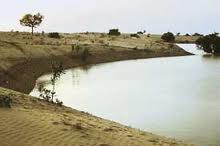Rethinking rehabilitation: socio-ecology of tanks and water harvesting in Rajasthan, North-West India
 In the arid and semi-arid Indian state of Rajasthan, tanks and ponds have been a mainstay of rural communities for centuries. There are over 4600 large minor irrigation tanks, plus numerous johads, bandhs and pals (small water harvesting structures). This paper assesses a strategy proposed for rehabilitating 1200 of the larger tanks. It argues that treating tanks only as flow irrigation systems—which lies at the center of the mainstream thinking on rehabilitating surface irrigation systems--is very likely to result in a flawed strategy when applied to tanks. Instead, reviewing the successful experience of NGOs like PRADAN and Tarun Bharat Sangh in reviving and rehabilitating clusters of small traditional water harvesting structures at a watershed level, it posits that Rajasthan’s tanks belong more to the watershed development domain than to the irrigation domain and that a strategy that views tanks as multi-use socio-ecological constructs, and which recognizes varied stakeholder groups is more likely to enhance the social value of tanks.
In the arid and semi-arid Indian state of Rajasthan, tanks and ponds have been a mainstay of rural communities for centuries. There are over 4600 large minor irrigation tanks, plus numerous johads, bandhs and pals (small water harvesting structures). This paper assesses a strategy proposed for rehabilitating 1200 of the larger tanks. It argues that treating tanks only as flow irrigation systems—which lies at the center of the mainstream thinking on rehabilitating surface irrigation systems--is very likely to result in a flawed strategy when applied to tanks. Instead, reviewing the successful experience of NGOs like PRADAN and Tarun Bharat Sangh in reviving and rehabilitating clusters of small traditional water harvesting structures at a watershed level, it posits that Rajasthan’s tanks belong more to the watershed development domain than to the irrigation domain and that a strategy that views tanks as multi-use socio-ecological constructs, and which recognizes varied stakeholder groups is more likely to enhance the social value of tanks.
